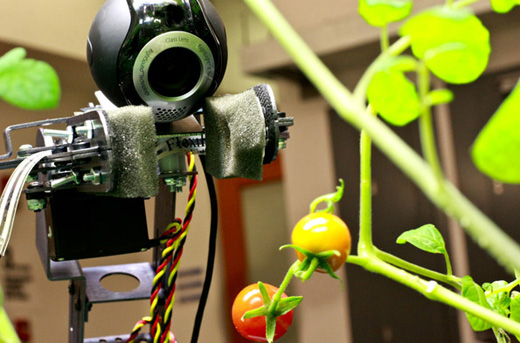Age of agribots: Professor speaks on robotic trends of the future
“Agribots” that plant seeds, cultivate soil, and harvest produce may sound like pure science fiction to some people.

However, not only are they already in use, present trends foretell a future in which agribots become as much a feature of our homes as personal computers or autonomous vacuum cleaners.
That’s one of the points Dr. Daniel Berleant made during a recent presentation at Worldfuture 2013 in Chicago.
Berleant, a professor at UALR’s Department of Information Science, spoke at a conference that bills itself as the place where visionaries can “imagine a better future and develop the resources needed to build it.”
Much of Berleant’s speech concerned trends and examples of agribots, as well as solar energy, and how those technologies will eventually affect our lives and society as a whole.
His predictions and proposals stem from a chapter on urbanization in his new book, “The Human Race to the Future: What Could Happen — and What to Do.”
Berleant said while urban environments offer distinct advantages that spur population growth compared with rural areas, the urban environment is also more prone to disruptive risks, from disease to socio-political disasters.
“Robotic technology can help enable people in urban areas to mitigate those kinds of risks as well as provide an alternative to urbanization,” Berleant said.
“You can imagine something like a Roomba, or robotic lawnmowers that some people are already using, and think about how that technology could go to the next level to effectively become personal gardeners and farmers,” he said.
These gardening and farming robots will enable a highly localized and decentralized food production system, according to Berleant, and breathe new life into rural and suburban populations.
Agribots would also enable people to become more fully self-sufficient as they grow much of their own food, organically or any other way they wish, with little or no labor.
The technology has already been demonstrated in other university labs using potted tomato plants, said Berleant. And a university in Japan is leading an agribot project focused on three staple crops, which it hopes to pilot test by next year.
Berleant, who received his degrees in computer science from the Massachusetts Institute of Technology and the University of Texas at Austin, said he has a long-standing desire to write about the future for the general public.
“There are a lot of people who are also intrigued by these things, so I’m just one of those many people,” he said. “These ideas are fun to think about and write about.”
This fall, Berleant is teaching a freshman experience course for information science and computer science majors, an undergraduate course on professional ethics, and a graduate-level course on bioinformatics.